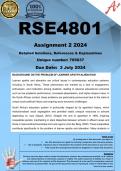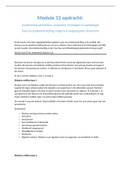RSE4801
Assignment 2 2024
Detailed Solutions, References & Explanations
Unique number: 705037
Due Date: 3 July 2024
BACKGROUND ON THE PROBLEM OF LEARNER APATHY/ALIENATION
Learner apathy and alienation are critical issues in contemporary education systems,
including in South Africa. These phenomena are marked by a lack of engagement,
enthusiasm, and motivation among students, leading to adverse educational outcomes
such as low academic performance, increased absenteeism, and higher dropout rates. In
the South African context, these problems are particularly pronounced due to the nation's
unique socio-political history and ongoing socio-economic challenges.
South Africa's education system is profoundly shaped by its apartheid history, which
institutionalized racial segregation and provided vastly unequal resources to schools
depending on race (Spaull, 2015). Despite the end of apartheid in 1994, lingering
inequalities persist, manifesting in stark disparities between schools in affluent areas and
those in impoverished townships and rural regions (Van der Berg, 2020). These inequalities
contribute significantly to the problem of learner apathy and alienation. Many students in
under-resourced schools face inadequate infrastructure, lack of learning materials, and
Terms
overcrowded classrooms, which can make the learning environment oppressive andof use
By making use of this document you agree to:
disempowering (Smit, 2018).
• Use this document as a guide for learning, comparison and reference purpose,
• Not to duplicate, reproduce and/or misrepresent the contents of this document as your own work,
• Fully accept the consequences should you plagiarise or misuse this document.
Disclaimer
Extreme care has been used to create this document, however the contents are provided “as is” without
any representations or warranties, express or implied. The author assumes no liability as a result of
reliance and use of the contents of this document. This document is to be used for comparison, research
and reference purposes ONLY. No part of this document may be reproduced, resold or transmitted in any
form or by any means.
, +27 67 171 1739
BACKGROUND ON THE PROBLEM OF LEARNER APATHY/ALIENATION
Learner apathy and alienation are critical issues in contemporary education systems,
including in South Africa. These phenomena are marked by a lack of engagement,
enthusiasm, and motivation among students, leading to adverse educational
outcomes such as low academic performance, increased absenteeism, and higher
dropout rates. In the South African context, these problems are particularly
pronounced due to the nation's unique socio-political history and ongoing socio-
economic challenges.
South Africa's education system is profoundly shaped by its apartheid history, which
institutionalized racial segregation and provided vastly unequal resources to schools
depending on race (Spaull, 2015). Despite the end of apartheid in 1994, lingering
inequalities persist, manifesting in stark disparities between schools in affluent areas
and those in impoverished townships and rural regions (Van der Berg, 2020). These
inequalities contribute significantly to the problem of learner apathy and alienation.
Many students in under-resourced schools face inadequate infrastructure, lack of
learning materials, and overcrowded classrooms, which can make the learning
environment oppressive and disempowering (Smit, 2018).
Socio-economic challenges further exacerbate learner apathy and alienation. High
levels of poverty, unemployment, and social instability prevalent in many South African
communities create an adversarial backdrop for students. The interplay between
socio-economic status and educational engagement is well-documented (Van der
Berg, 2016). Learners from deprived backgrounds often grapple with additional
responsibilities at home, nutritional deficiencies, and inadequate learning
environments. This compounded stress detracts from their ability to focus on and
invest in their education, resulting in heightened absenteeism and eventually,
dropouts.
The educational environment and the quality of teacher-student relationships also play
a pivotal role. A significant number of South African schools are characterized by
overcrowded classrooms, limited resources, and a lack of adequately trained teachers
(Department of Basic Education, 2018). Such conditions create oppressive learning
environments where individual attention is scant, and personalized pedagogical
methods are untenable. Moreover, the high-stakes emphasis on standardized testing
Disclaimer
Extreme care has been used to create this document, however the contents are provided “as is” without
any representations or warranties, express or implied. The author assumes no liability as a result of
reliance and use of the contents of this document. This document is to be used for comparison, research
and reference purposes ONLY. No part of this document may be reproduced, resold or transmitted in any
form or by any means.







